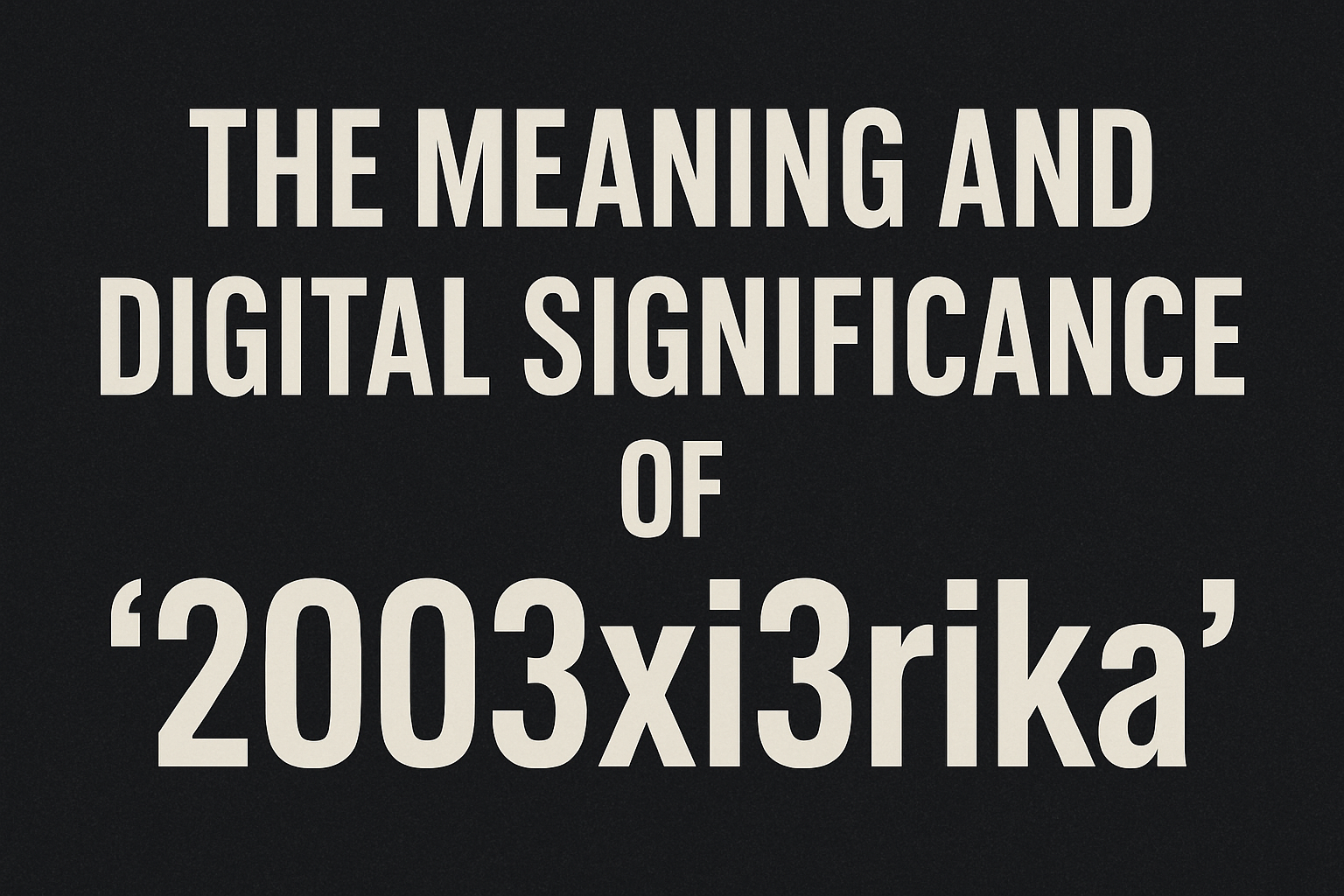At first glance, “2003xi3rika” may appear to be nothing more than a random string of numbers and letters, yet in the age of digital identity, there is rarely anything accidental about such creations. The internet has always thrived on individuality, where users shape unique identifiers to stand out in communities ranging from gaming forums to social media platforms. “2003xi3rika” embodies this idea: it is cryptic, personal, and resistant to duplication. Such identifiers often have stories behind them, and even when those stories remain private, they still become part of the fascinating fabric of online culture. To understand “2003xi3rika,” we need to look at how numbers, letters, and cultural references combine to create something meaningful, even if its meaning lies just outside mainstream recognition.
Breaking Down the Structure of “2003xi3rika”
The term can be broken into three parts: 2003, xi3, and rika. Each piece contributes to the identity of the whole. The sequence 2003 almost certainly refers to a year, which could carry multiple forms of significance — it might represent a birth year, the year a community was formed, or a year tied to some pivotal moment in culture or technology. The middle section, xi3, feels deliberately cryptic, almost like a puzzle piece within the name. In online culture, such cryptic fragments are common, as they allow users to create names that appear distinctive and resistant to duplication across platforms. The final section, rika, is the most humanizing element. “Rika” is a personal name found in Japanese, Scandinavian, and Slavic traditions, giving the entire identifier a touch of individuality and cultural grounding. When stitched together, these three elements become more than a random code: they become a digital signature that feels both personal and enigmatic.
The Cultural Weight of the Year 2003
The inclusion of the year 2003 is particularly intriguing, as years are often central markers in personal and collective memory. Globally, 2003 was a year marked by dramatic shifts in technology, politics, and entertainment. It was around this time that the internet began to solidify as an everyday utility for households, rather than a niche tool for enthusiasts. Online communities expanded, forums thrived, and early social media platforms were beginning to make their mark. For individuals born in or around 2003, the number could be directly tied to identity — signaling age, generational belonging, or personal milestones. Moreover, many iconic works of pop culture were released in that year: video games, anime series, and films that continue to inspire online communities today. By embedding “2003” in the identifier, the creator of “2003xi3rika” may be tying themselves to that cultural and generational moment.
Usernames and the Quest for Digital Identity
In an online world saturated with millions of users, finding a unique identity is a constant challenge. A simple name like “Rika” would already be claimed across most major platforms, leaving users with no choice but to experiment with combinations of numbers, symbols, and additional characters. “2003xi3rika” reflects this strategy perfectly. It demonstrates how users adapt to digital constraints by creating names that are both memorable and resistant to duplication. This isn’t just about having a username to log in with — it’s about crafting an identity that can travel across communities, from gaming platforms to discussion boards, while remaining recognizable. Unique identifiers also allow individuals to maintain consistency across platforms, building reputations and personal brands that feel coherent. In this sense, “2003xi3rika” is not just a name but a digital fingerprint, one that likely belongs to someone who values individuality in their online persona.
Possible Cultural Influences in the Identifier
The presence of the name “Rika” opens the door to cultural interpretation. In Japanese, Rika is a relatively common given name, often appearing in anime, manga, and video games. Fans of Japanese pop culture frequently adopt such names as part of their online aliases, as a way of honoring characters or cultural references that hold personal significance. In Scandinavian languages, Rika can mean “wealth” or “prosperity,” suggesting strength and resilience. Meanwhile, in Slavic contexts, variations of the name carry slightly different meanings but still retain a sense of familiarity and femininity. By fusing this human name with cryptic and numerical elements, the identifier becomes a hybrid of the personal and the mysterious — a reflection of how internet culture constantly merges global influences into new forms of expression.
The SEO Value of a Unique Name
Beyond its role as a personal identifier, “2003xi3rika” holds value in the realm of search engine optimization (SEO). Unlike generic terms, which are highly competitive and difficult to rank for, a name like this one is classified as a long-tail phrase. Long-tail phrases are specific, unique, and often used to target niche audiences. Because “2003xi3rika” is so distinctive, any content built around it — whether it be a blog, an art portfolio, or a gaming profile — has a high likelihood of appearing at the top of search engine results. This makes the name ideal for digital branding. Someone who builds an online presence around “2003xi3rika” would be able to dominate search rankings for that term, ensuring that their personal identity or creative work remains easily discoverable. In a digital world where visibility is currency, such uniqueness is a powerful advantage.
Applications in Gaming Communities
Gaming has always been a fertile ground for unique identifiers, and “2003xi3rika” fits seamlessly into that culture. Usernames in gaming serve multiple purposes: they act as player identifiers, expressions of personality, and sometimes even reputational markers within communities. A player with a unique and memorable tag often stands out in competitive environments, where recognition can carry as much weight as skill. The mix of numbers and letters in “2003xi3rika” aligns perfectly with established gamer-tag culture, which often embraces creativity, cryptic elements, and stylization. It is easy to imagine this name appearing in leaderboards, guild rosters, or esports communities, where the uniqueness of the name alone contributes to its memorability. Beyond recognition, the very construction of the identifier suggests a user who understands the importance of crafting a distinct digital presence in spaces that thrive on competition and individuality.
Creative and Artistic Significance
For artists, writers, and independent creators, pseudonyms play a vital role in how they present their work to the world. A name like “2003xi3rika” carries artistic potential because it evokes curiosity and feels deliberately constructed. An illustrator might use it to sign their work on digital platforms such as DeviantArt, Instagram, or Behance, ensuring that their portfolio is tied to a memorable and searchable identity. A writer could adopt it as a pen name, benefiting from its mysterious edge and uniqueness in literary communities. Even musicians or digital performers might choose such an alias, as it creates a sense of intrigue before their audience ever encounters the actual art. The ability of “2003xi3rika” to function across multiple creative domains highlights how versatile such identifiers can be, bridging personal significance with professional branding.
Why Unique Identifiers Like “2003xi3rika” Matter in Digital Culture
While “2003xi3rika” might seem obscure, it is part of a larger trend where people create complex identifiers to navigate digital spaces. In an online world of billions of users, standing out requires creativity, and names like this one are evidence of that. They serve as markers of individuality, cultural intersection, and sometimes even generational identity. More importantly, they remind us that digital culture thrives not only on widely recognized names but also on unique personal signatures that give communities their diversity. In this sense, “2003xi3rika” is more than just a string of letters and numbers — it is a microcosm of how humans adapt their identities to the challenges and opportunities of the digital age.








